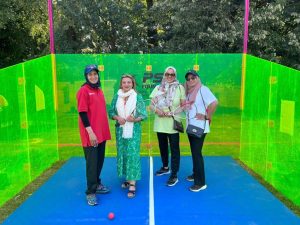It’s hard to believe that it’s a year already since Birmingham hosted the 2022 Commonwealth Games, from which the most talked about event at the games was Squash.

Photo credit: World Squash Federation
Compared to the other sports at the Commonwealth Games, the Birmingham Squash faithful were planning to capitalise with new initiatives designed to get everyone across the communities in the great city to take up Squash.
As a company, we have been very vocal about growing Squash in local communities amongst people of all cultures – so, for the past year we watched and read about how Birmingham is working towards a Commonwealth Games legacy with Squash.
Thriving for community engagement
So what has been done? Well, the number of projects that have taken place have certainly got Birmingham to be the number one destination for Squash.
Let’s not forget Squash United, a major program – which has been the catalyst for bringing Squash to the forefront of the West Midlands.

The England Squash legacy program has been a beacon of change, positively transforming lives and benefiting communities across the region.
The appointment of Asma Ajaz-Ali, as the Community Engagement Manager whose background includes sports development has been leading the way to get local people in Birmingham and other parts of the West Midlands to deliver a legacy initiative in Squash.

Asma (left in red) with her team (Credit: England)
With funding from Sport England in the spring of the preceding year, Asma’s remit was set with a clear mission: to foster a lasting legacy for squash and raise awareness of the sport among new and diverse audiences. The initiative was born out of the realisation that ethnically diverse communities held a strong affinity for squash but had a considerably low rate of participation, due to a variety of reasons.
Data from Sport England had shown the inequalities faced by people from ethnic communities, putting that into context 2 in 5 individuals didn’t have the same opportunities to participate in sports and physical activities compared to their white counterparts.
Taking this on board, England Squash were on a mission to change the narrative in engaging local people to take up Squash.
Already Asma’s tireless efforts have yielded remarkable results, with over 6,000 individuals inspired to give squash a try and a striking 300 new regular players joining the ranks in Birmingham.
The significance of this achievement is amplified by the fact that 84% of these new players come from lower socio-economic backgrounds, a demographic that often faces barriers to sports access. Additionally, an overwhelming 95% of these newcomers belong to non-white ethnicities, reflecting a breakthrough in diversifying Squash’s player base.
What has been key to the successful engagement of Squash participation, is the importance of a place-based approach – something that most sports do as a form of a taster engagement activity to generate interest.
Putting this into the context of Squash, Asma and her team set about bringing Squash into the community – through stands at local community events and festivals, in and around Birmingham.
Transforming lives through Squash
From our contacts in Birmingham, this has involved the use of portable mini courts at school games, community gatherings, and squash events, such as the Commonwealth Games, the Big John’s Mela, Bring the Power, and the British Open. The ingenious placement of pop-up courts in youth clubs and community centres has been instrumental in creating awareness about squash.
Overall, this is a standout achievement that has been witnessed in a youth centre, where Asma’s team provided a rebound wall. Over 350 participants from the Holiday and Activities Food program were introduced to squash, and their enthusiasm has led to the continued interest and even self-made squash courts on their walls.
This epitomizes the profound impact of fostering engagement through hands-on experiences – something we reckon is an excellent way of way engaging with the public when it comes to generating interest in Squash.
Collaborative advantage in the community
The one thing that has been key to Birmingham’s Squash Commonwealth Legacy is – collaborative advantage.
Putting that in context, there has been partnering with local community leaders from which strong relationships have been established in order to reach key market segments.
Asma has built relationships with local groups who know their community better than anyone, in bringing the sport to them and working together to provide meaningful, which equates to providing opportunities to take part.
From a business perspective, this collaborative approach ensures that the activity is tailored to the community’s needs, thereby enhancing its sustainability over the long term.
Given the situation with Squash provision over the years, collaboration with local leisure centres and clubs has played a pivotal role in increasing participation. From facilities like the Small Health Wellbeing Centre to renowned squash clubs like Edgbaston Priory, the program has worked to connect people with venues that match their budgets and preferences, democratizing access to squash.
Building upon year one
Looking to the future, England Squash is poised to expand its impactful approach to other areas in the wider West Midlands region, with aspirations for national implementation.
Community engagement is just the start of Birmingham’s Commonwealth Squash legacy – there’s no doubt that we can expect to see more outdoor presence of Squash at community festivals, something that is a great outreach tactic in order to build up leads.
Nevertheless, the work so far in bringing Squash to ethnically diverse communities is going to help with a squash campaign that is set to launch in the coming autumn. This campaign aims to further amplify the visibility of squash and inspire more individuals from these communities to take to the court.
Seeing the England Squash legacy initiative led by Asma is proving to be a dynamic force in transforming lives, bridging gaps, and fostering inclusivity through the power of sport.
With its community-driven approach and dedication to breaking barriers, this legacy program is not only celebrating the successes of the past but also paving the way for a more diverse and vibrant future in the realm of squash.
To sum up, we strongly believe this approach to bringing Squash to the community will drive more participation from people of all cultural backgrounds, which can result in seeing more demand for Squash provision – let’s hope this can lead to the creation of more Squash courts at venues (subject to planning) and even outdoor Squash courts.
Well done to England Squash and Asma.





